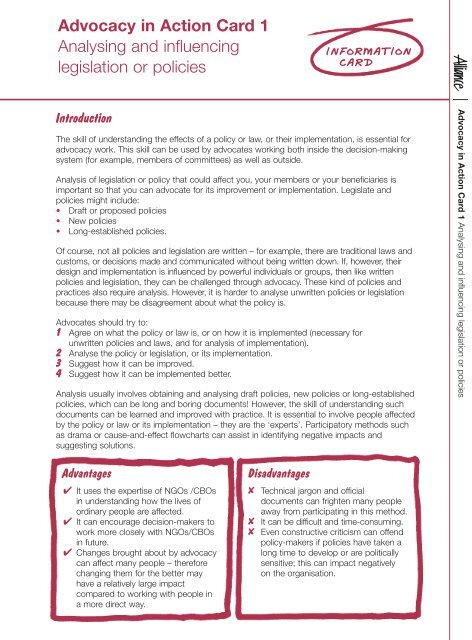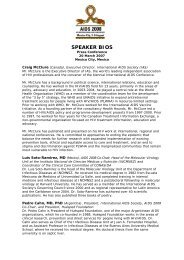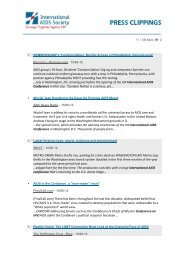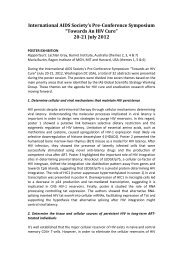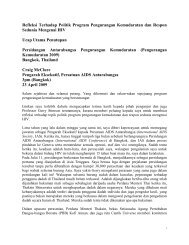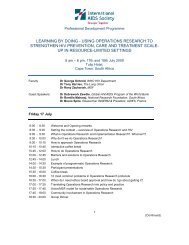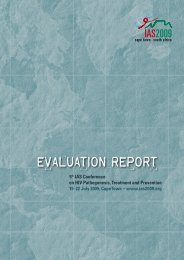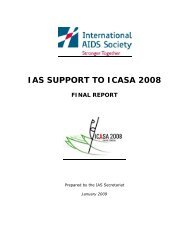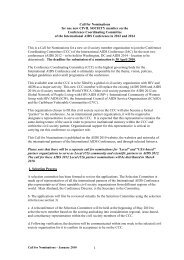Advocacy in Action - International AIDS Society
Advocacy in Action - International AIDS Society
Advocacy in Action - International AIDS Society
Create successful ePaper yourself
Turn your PDF publications into a flip-book with our unique Google optimized e-Paper software.
<strong>Advocacy</strong> <strong>in</strong> <strong>Action</strong> Card 1<br />
Analys<strong>in</strong>g and <strong>in</strong>fluenc<strong>in</strong>g<br />
legislation or policies<br />
INFORMATION<br />
CARD<br />
Introduction<br />
The skill of understand<strong>in</strong>g the effects of a policy or law, or their implementation, is essential for<br />
advocacy work. This skill can be used by advocates work<strong>in</strong>g both <strong>in</strong>side the decision-mak<strong>in</strong>g<br />
system (for example, members of committees) as well as outside.<br />
Analysis of legislation or policy that could affect you, your members or your beneficiaries is<br />
important so that you can advocate for its improvement or implementation. Legislate and<br />
policies might <strong>in</strong>clude:<br />
• Draft or proposed policies<br />
• New policies<br />
• Long-established policies.<br />
Of course, not all policies and legislation are written – for example, there are traditional laws and<br />
customs, or decisions made and communicated without be<strong>in</strong>g written down. If, however, their<br />
design and implementation is <strong>in</strong>fluenced by powerful <strong>in</strong>dividuals or groups, then like written<br />
policies and legislation, they can be challenged through advocacy. These k<strong>in</strong>d of policies and<br />
practices also require analysis. However, it is harder to analyse unwritten policies or legislation<br />
because there may be disagreement about what the policy is.<br />
Advocates should try to:<br />
1 Agree on what the policy or law is, or on how it is implemented (necessary for<br />
unwritten policies and laws, and for analysis of implementation).<br />
2 Analyse the policy or legislation, or its implementation.<br />
3 Suggest how it can be improved.<br />
4 Suggest how it can be implemented better.<br />
Analysis usually <strong>in</strong>volves obta<strong>in</strong><strong>in</strong>g and analys<strong>in</strong>g draft policies, new policies or long-established<br />
policies, which can be long and bor<strong>in</strong>g documents! However, the skill of understand<strong>in</strong>g such<br />
documents can be learned and improved with practice. It is essential to <strong>in</strong>volve people affected<br />
by the policy or law or its implementation – they are the ‘experts’. Participatory methods such<br />
as drama or cause-and-effect flowcharts can assist <strong>in</strong> identify<strong>in</strong>g negative impacts and<br />
suggest<strong>in</strong>g solutions.<br />
<strong>Advocacy</strong> <strong>in</strong> <strong>Action</strong> Card 1 Analys<strong>in</strong>g and <strong>in</strong>fluenc<strong>in</strong>g legislation or policies<br />
Advantages<br />
✔ It uses the expertise of NGOs /CBOs<br />
<strong>in</strong> understand<strong>in</strong>g how the lives of<br />
ord<strong>in</strong>ary people are affected.<br />
✔ It can encourage decision-makers to<br />
work more closely with NGOs/CBOs<br />
<strong>in</strong> future.<br />
✔ Changes brought about by advocacy<br />
can affect many people – therefore<br />
chang<strong>in</strong>g them for the better may<br />
have a relatively large impact<br />
compared to work<strong>in</strong>g with people <strong>in</strong><br />
a more direct way.<br />
Disadvantages<br />
✘ Technical jargon and official<br />
documents can frighten many people<br />
away from participat<strong>in</strong>g <strong>in</strong> this method.<br />
✘ It can be difficult and time-consum<strong>in</strong>g.<br />
✘ Even constructive criticism can offend<br />
policy-makers if policies have taken a<br />
long time to develop or are politically<br />
sensitive; this can impact negatively<br />
on the organisation.


